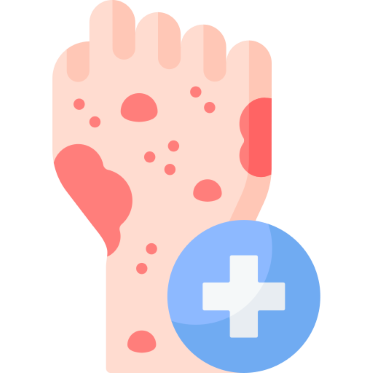Home > Speciality > Dermatology
Dermatology
Dermatology is a branch of medicine that focuses on diagnosing, treating, and managing conditions related to the skin, hair, and nails. The skin, being the largest organ of the human body, serves as a protective barrier against environmental damage, helps regulate body temperature, and plays a significant role in sensory perception. Dermatologists are medical professionals who specialise in this field, ensuring that the skin remains healthy and treating various skin-related conditions, from common issues to more complex diseases.
Dermatology is a diverse and multifaceted specialty with numerous subspecialties within hospitals and clinics. It encompasses everything from basic skincare and disease management to advanced surgical procedures. Here are three examples of general dermatology specialties often found in hospitals

Specialities

Medical Dermatology : Medical dermatology focuses on diagnosing and managing diseases of the skin, hair, and nails. Conditions often treated include acne, psoriasis, eczema, and fungal infections.
Read More
Paediatric Dermatology : Paediatric dermatology is dedicated to treating skin conditions in children, from newborns to adolescents. Common paediatric skin conditions include diaper rash, birthmarks, skin infections, and atopic dermatitis.
Read More
Cosmetic Dermatology : Cosmetic dermatology involves procedures and treatments aimed at improving the appearance of the skin.
Read More
FAQ's
-
What Is A Dermatologist And What Do They Treat?
Dermatologists are doctors with added training that allows them to diagnose and treat disease of the skin, hair, nails and mucous membranes. Dermatologists treat skin cancers, moles, warts, fungal infections, psoriasis, acne, dry skin, contact dermatitis and other skin conditions and perform cosmetic procedures. Dermatologists are also surgeons to prevent or provide early control of disease and improve how the skin looks. -
When Should I See A Dermatologist?
You should see a dermatologist immediately if you have areas on your skin that grow or change shape and colour, itches or bleeds or would not heal. In addition, you should see your dermatologist immediately if you have areas that ooze fluid or blood, crust or clot over, and then ooze or bleed again as well as any sore that doesn't heal after 2 two weeks.
-
What Are The Best Moisturizers, Soaps, Or Cosmeceuticals?
Petrolatum, an ingredient in many lotions, creams and ointments, is an excellent moisturiser. Other ingredients such as urea, alpha hydroxy acids, lactic acid, and ammonium lactate help the skin hold water. -
How Do You Treat Dry, Itchy Skin?
Dry, itchy skin can be treated with a moisturiser after bathing while the skin is still damp. Petrolatum, an ingredient in many lotions, creams and ointments, is an excellent moisturiser. Other ingredients such as urea, alpha hydroxy acids, lactic acid, and ammonium lactate help the skin hold water.
